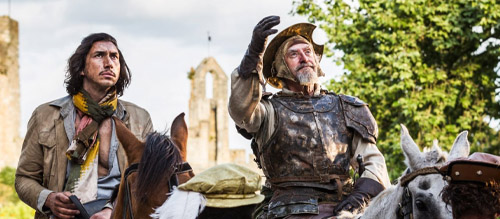
The Man Who Killer Don Quixote (2018)
Director: Terry Gilliam
Screenwriters: Terry Gilliam, Tony Grisoni
Starring: Adam Driver, Jonathan Pryce, Olga Kurylenko, Joana Ribeiro, Stellan Skarsgård, Jordi Mollà, Jason Watkins, Hovik Keuchkerian
Remember those many, many years when The Man Who Killed Don Quixote was Schrodinger’s Masterpiece? It had spent so long in development hell, and Terry Gilliam had seemingly sacrificed so much of his life and soul for little result, it became a purely hypothetical film, existing as a towering achievement and the ultimate act of hubris at the same time. Then, at long last, it was made, and it was released. Then, nearly two years later still, it was released in the UK.
Sorry, Terry G, but this really wasn’t worth the 29 year wait. That said, we can all be very happy for you that you’ve finally fought your windmill.
A talented but troubled filmmaker (Adam Driver) encounters an old man (Jonathan Pryce) who played Don Quixote for him ten years before, but finds him under the dilution that he actually is Cervantes’ iconic character. The pair go on a journey and find strange parallels from the page appearing in real life.
Well-documented, particularly by the 2002 making-of-turned-what-happened-documentary Lost in La Mancha, The Man Who Killed Don Quixote was thought a cursed project having been in screenplay form since 1989 and in various stages of production since 1998. Movingly, the final film is dedicated to Gilliam’s sadly departed nearly-Quixotes Jean Rochefort and John Hurt.
While he may always have been a director driven by visuals over plotting, this is scatological storytelling even by Gilliam’s standards. When you get past the somewhat laboured setup of a prodigious director struggling to get his latest masterpiece made (subtle), it’s just a series of things happening with little or no connective tissue.
You can understand a man under the delusion he is Don Quixote drifting through a story like this, heedless of plot or motivation, but you need more for the surrounding players to want and need, reasons for them to exist.
To paraphrase the stoning routine in Life of Brian, “Are we going to let the women do anything here?”. Gilliam has under-served his female characters in the past, and here he sadly does it again. While “Don Quixote” might be a male-centric story in its original form, it doesn’t need to be today. The two main female characters are either something to be attained by the men or underdeveloped to the degree that they just fulfill a story function rather than be allowed to be motivated characters of their own. Olga Kurylenko and Joana Ribeiro are both fine, but there’s only so much they can do running after Adam Driver to either kill him or have sex with him.
Gilliam’s film also has a troubling relationship with certain ethnic groups. Toby gets a Romani man arrested to get away with an affair with his boss’s (a bored-sounding Stellan Skarsgård) wife and later quickly comes to the conclusion he has been captured by terrorists when he sees a prayer mat in the house he wakes up in. He’s quickly proven wrong, his hosts turning out to be innocent migrants, but these moments feel lazy and needlessly mean, perhaps remnants of the script as it was in the 1990s.
Driver’s performance as awful human being and time-hopping Sancho Panza stand-in Toby is great of course, but you don’t get points for Adam Driver being great anymore. At least Jonathan Pryce didn’t have to learn a new accent for Quixote, making this and The Two Popes where he played Pope Francis in quick succession, but otherwise this tragic madman is very much in his comfort zone. The rest of the cast either seem to be lacking direction or defaulting to that Gilliam movie default of overplaying everything.
You of course get flourishes of Gilliam on top form – his visuals are as always pristine. The beautiful Spanish locations do a lot of the work, but when Gilliam and his production designers are let loose to craft an odd, detailed interior, or lived-in costumes, they do so with panache.
After such a long wait I doubt any viewer will be truly satisfied with this as Terry Gilliam’s magnum opus. Despite the script having existed for three decades, the character work feels rushed and ill-defined, few vignettes are strong enough on their own, and the whole thing feels muddled and laboured. Even if the film admittedly looks good throughout, more could have been done with the inconsistent reality of this world, and you’re wishing for a few more lasting images to be seared into your brain like the iconic red knight coming out of the fog in the thematically similar, and much better, Fisher King.
8/24

